Mises, Ludwig von. Human Action: A Treatise on Economics
Подождите немного. Документ загружается.

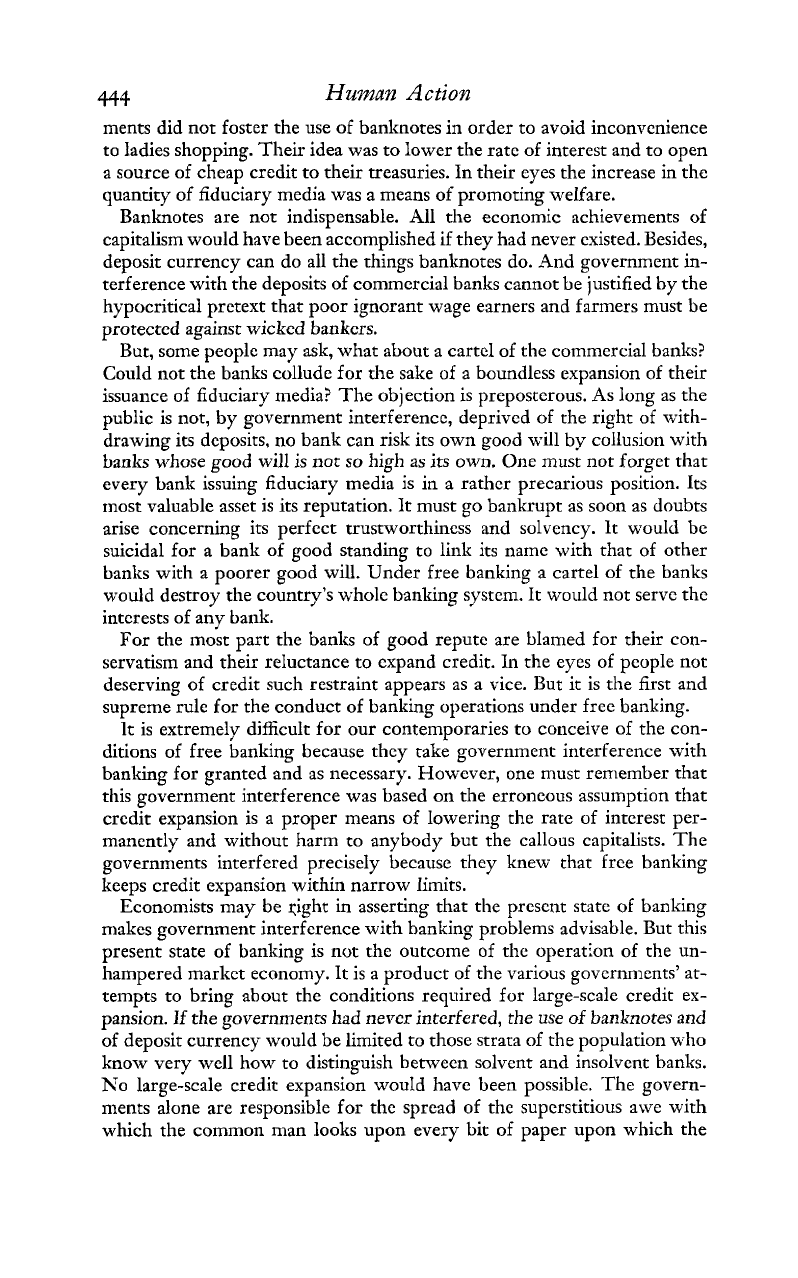
444
Human
Action
ments did not foster the use of banltnotes in order to avoid inconvenience
to ladies shopping. Their idea was to lower the rate of interest and to open
a source of cheap credit to their treasuries. In their eyes the increase in the
quantity of fiduciary media was a means of promoting welfare.
Banknotes are not indispensable. All the economic achievements of
capitalism would have been accomplished if they had never existed. Besides,
deposit currency can do all the things banknotes do. And government in-
terference with the deposits of commercial banks cannot be justified by the
hypocritical pretext that poor ignorant wage earners and farmers must be
protected against wicked bankers.
But, some people may ask, what about a cartel of the commercial banks?
Could not the banks collude for the sake of a boundless expansion of their
issuance of fiduciary media? The objection is preposterous. As long as the
public is not, by government interference, deprived of the right of with-
drawing its deposits, no bank can risk its own good will by collusion with
banks whose good will is not so high as its own. One must not forget that
every bank issuing fiduciary media is in a rather precarious position. Its
most valuable asset is its reputation. It must go bankrupt as soon as doubts
arise concerning its perfect trustworthiness and solvency. It would be
suicidal for a bank of good standing to link its name with that of other
banks with a poorer good will. Under free banking a cartel of the banks
would destroy the country's wholc banking system. It would not servc the
interests of any bank.
For the most part the banks of good repute are blamed for their con-
servatism and their reluctance to expand credit. In the eyes of people not
deserving of credit such restraint appears as a vice. But it is the first and
supreme rule for the conduct of banking operations under frce banking.
It is extremely difficult for our contemporaries to conceive of the con-
ditions of free banking because they take government interference with
banking for granted and as necessary. However, one must remember that
this government interference was based on the erroneous assumption that
credit expansion is a proper means of lowering the rate of interest per-
manently and without harm to anybody but the callous capitalists. The
governments interfered precisely because they knew that frce banking
keeps credit expansion within narrow limits.
Economists may be ~ight in asserting that the present state of banking
makes government interference with banking problems advisable. But this
present state of banking is not the outcome of the operation of the un-
hampered market economy. It is a product of the various governments' at-
tempts to bring about the conditions required for large-scale credit ex-
pansion.
If
the governments
had
nevcr interfered, the use of
banknotes
and
of deposit currency would be limited to those strata of the population
u
110
know very well how to distinguish between solvent and insolvent banks.
KO large-scale credit expansion wouId have been possible. The govern-
ments alone are responsible for the spread of the superstitious awe with
which the common man looks upon every bit of paper upon which the
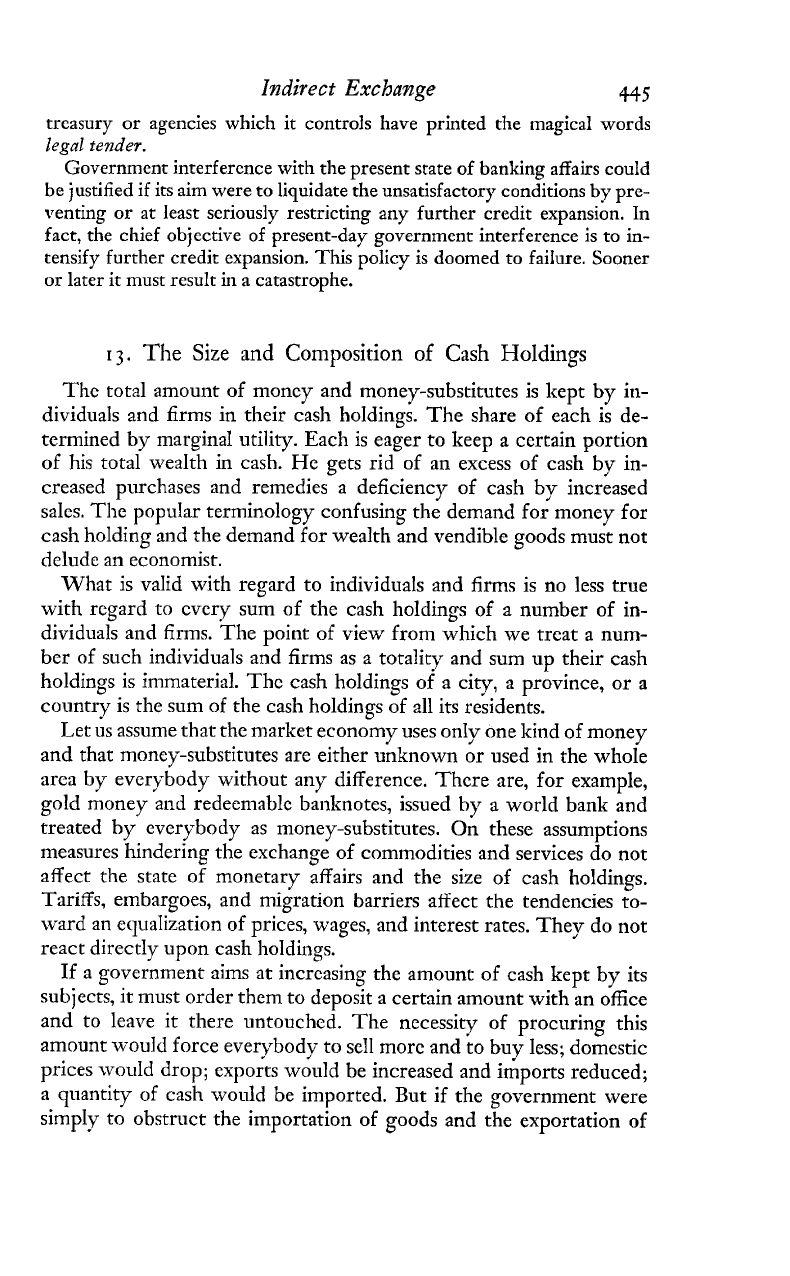
Indirect
Exchange
445
treasury or agencies which it controls have printed the magical words
legal
tender.
Government interfercnce with the present state of banking affairs could
be
justified if its aim were to liquidate the unsatisfactory conditions by pre-
venting or
at
least seriously restricting any further credit expansion. In
fact, the chief objective of present-day government interference is to in-
tensify further credit expansion. This policy is doomed to faiIure. Sooner
or later it must result in a catastrophe.
I
3.
The Size and Composition of Cash Holdings
The total amount of money and money-substitutes is kept by in-
dividuals and firms in their cash holdings. The share of each is de-
termined by marginal utility. Each is eager to keep
a
certain portion
of his total wealth in cash. He gets rid of an excess of cash by in-
creased purchases and remedies a deficiency of cash by increased
sales. The popular terminology confusing the demand for money for
cash holding and the demand for wealth and vendible goods must not
delude an economist.
What is valid with regard to individuals and firms is no less true
with regard to cvery sum of the cash holdings of
a
number of in-
dividuals and firms.
he
point of view from which we treat
a
num-
ber of such individuals and firms as a totality and sum
up
their cash
holdings is immaterial. The cash holdings
oi
a city,
a
province, or
a
country is the sum of the cash holdings of all its residents.
Let us assume that the market economy uses only one kind of money
and that money-substitutes are either unknown or used in the whole
arca by everybody without any difference. Thcre are, for example,
gold money
and
redeemable banknotes, issued
by
a
world bank and
treated by everybody as money-substitutes. On these assumptions
measures hindering the exchange of commodities and services do not
affect the state of monetary affairs and the size of cash holdings.
Tarifis, embargoes, and migration barriers affect the tendencies to-
ward an equalization of prices, wages, and interest rates. They do not
react directly upon cash holdings.
If a government aims at increasing the amount of cash kept by its
subjects, it must order them to deposit
a
certain amount with an office
and to leave it there untouched. The necessity of procuring this
amount
would
force everybody to sell more and ;o buy less; domestic
prices would drop; cxports would be increased and imports reduced;
a quantity of cash would be imported. But if the government were
simply to obstruct the importation of goods and the exportation of
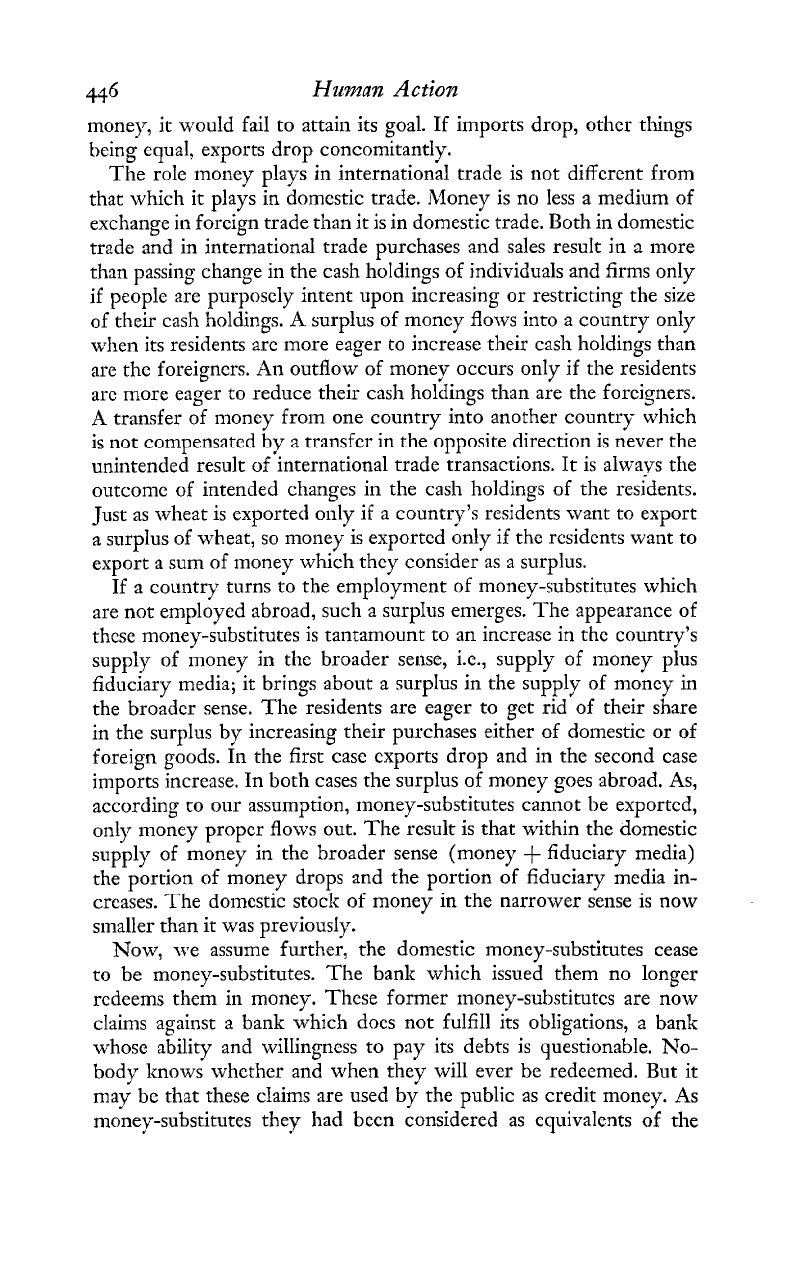
446
Human
Action
money, it would fail to attain its goal. If imports drop, other things
being equal, exports drop concomitantly.
The role money plays in international trade is not diffcrcnt from
that which
it
plays in domestic trade. Money is no less a medium of
exchange in foreign trade than it is in domestic trade. Both in domcstic
trade and in international trade purchases and sales result in
a
more
than passing change in the cash holdings of individuals and firms only
if people are purposely intent upon increasing or restricting the size
of their cash holdings. A surplus of moncy flows into a country only
when its rcsidents are more eager to increase their cash holdings than
are the foreigners. An outflow of money occurs only if the residents
arc more eager to reduce their cash holdings than are the foreigners.
A
transfer of money from one country into another country which
is not compensated by a transfcr in the opposite direction is never the
unintended result of international trade transactions. It is always the
outcome of intended changes in the cash holdings of the residents.
Just as wheat is cxported only if a country's residents want to export
a surplus of wheat, so money is exportcd only if the rcsidcnts want to
export
a
sum of money which they consider as a surplus.
If
a
country turns to the employment of money-substitutes which
are not employed abroad, such a surpIus emerges. The appearance of
these money-substitutes is tantamount to an increase in the country's
supply of money in the broader sense, i.c., supply of money plus
fiduciary media; it brings about a surplus in the supply of moncy in
the broadcr sense. The residents are eager to get rid of their share
in the surplus by increasing their purchases either of domestic or of
foreign goods. In the first case cxports drop and in the second case
imports increase. In both cases the surplus of money goes abroad. As,
according to our assumption, money-substitutes cannot
be
exportcd,
only money proper flows out. The result is that within the domestic
supply of money in the broader sense (money
+
fiduciary media)
the portion of money drops and the portion of fiduciary media in-
creases. The domestic stock of money in the narrower sense is now
smaller than it was previously.
Now, we assume further, the domestic money-substitutes cease
to be money-substitutes. The bank which issued them no longer
redeems them in money. These former ~noney-substitutes are now
claims against a bank which does not fulfill its obligations,
a
bank
whose ability and wilIingncss to pay its debts is questionable. No-
body knows whcther and when they will ever be redeemed. But it
may
be that these claims are used by the public as credit money. As
money-substitutes they had been considered as equivalents of the
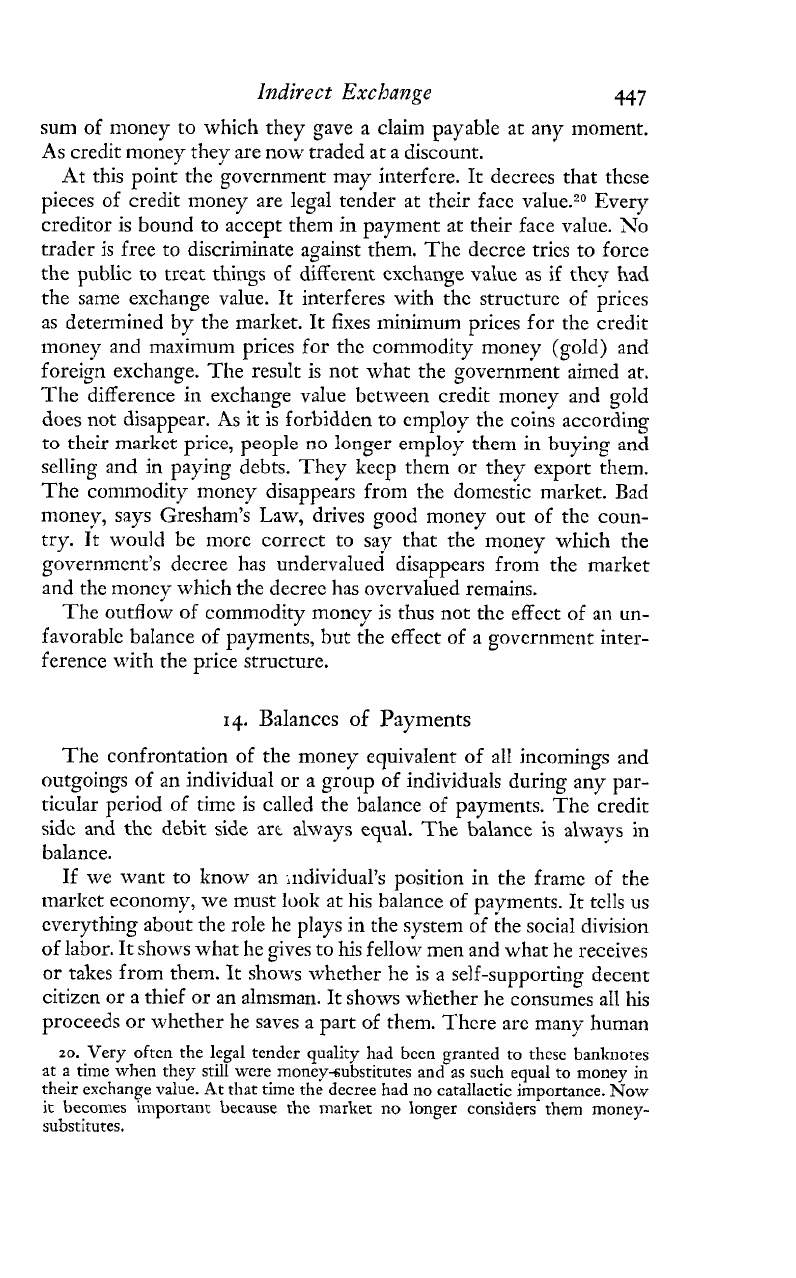
lndirect
Exchange
447
sum of money to which they gave a claim payable at any moment.
As credit money they are now traded at a discount.
At
this point the government may interfere. It decrees that these
pieces of credit money are legal tender at their face value.'O Every
creditor is bound to accept them in payment at their face value. No
trader is free to discriminate acrainst them. The decree tries to force
P
the public to treat things of
different
exchange value as
if
they had
the same exchange value. It interferes with the structure of prices
as determined by the market. It fixes ~ninimum prices for the credit
money and maximum prices for the commodity money (gold) and
fore& exchange. The result is not what the government aimed at.
The difference in exchange value between credit money and gold
does not disappear. As it is forbidden to employ the coins according
to their market price, people no longer employ them in buying and
selling and in paying debts. They keep them or they export them.
The conmodity money disappears from the domestic market. Bad
money, says
res sham's
Law, drives good money out of the coun-
try.
It
would be more correct to say that the money which the
government's decree has undervalued disappears from the market
and the money which the decree has overvalued remains.
The outflow of commodity money is thus not the effect of an un-
favorable balance of payments, but the effect of a government inter-
ference with the price structure.
14.
Balances
of
Payments
The confrontation of the money equivalent of all incomings and
outgoings of an individual or a group of individuals during any par-
ticular period of time is called the balance of payments. The credit
side and the
debit
side
art
always equal. The balance is always in
balance.
If we want to know an ,ndividual's position in the frame of the
tnarltet economy, we must look at his balance of payments. It tells us
everything about the role he plays in the system of the social division
of labor. It shows what he gives to his fellow men and what he receives
or
takes from them.
It
shows whether he is a self-supporting decent
citizen or a thief or an almsman. It shows whether he consumes a11 his
proceeds or whether he saves a part of them. There are many human
20.
Very often the legal tender quality had bccn granted to these banknotes
at a time when they still were money-wbstitutes and as such equal to money in
their exchange value. At
that
time the decree had no catallactic importance.
Now
it
becomes important because the market no longer considers them money-
substitutes.
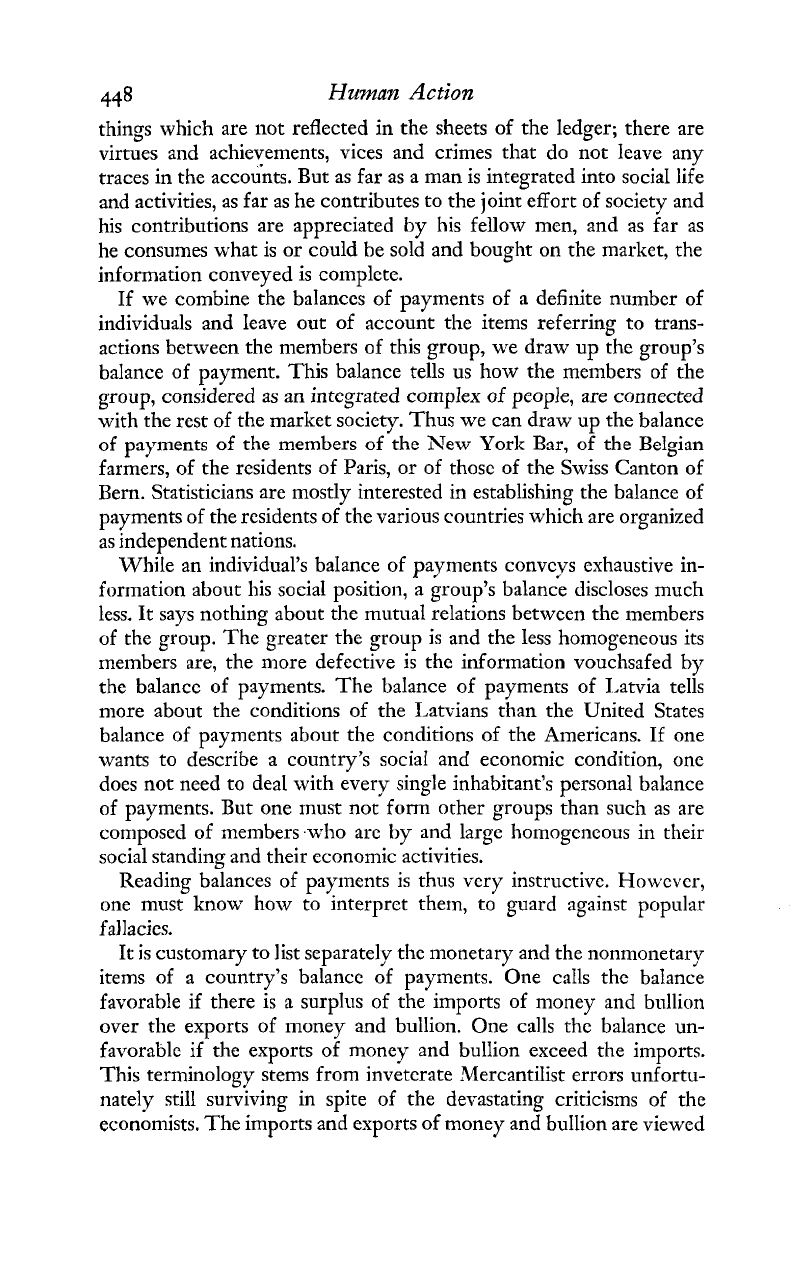
448
Human
Action
things which are not reflected in the sheets of the ledger; there are
virtues and achievements, vices and crimes that do not Ieave any
traces in the accoints. But as far as a man is integrated into socia1 life
and activities, as far as he contributes to the joint effort of society and
his contributions are appreciated by his fellow men, and as far as
he consumes what is or could be sold and bought on the market, the
information conveyed is complete.
If we combine the balances of payments of
a
definite number of
individuals and Ieave out of account the items referring to trans-
actions between the members of this group, we draw up the group's
balance of payment. This balance tells us how the members of the
group, considered as an integrated complex of people,
are
connected
with the rest of the market society. Thus we can draw up the balance
of payments of the members of the New York Bar, of the Belgian
farmers, of the residents of Paris, or of those of the Swiss Canton of
Bern. Statisticians are mostly interested in establishing the balance of
payments of the residents of the various countries which are organized
as independent nations.
While an individual's balance of payments convcys exhaustive in-
formation about his social position, a group's balance discloses much
less. It says nothing about the mutual relations between the members
of the group. The greater the group is and the less homogeneous its
members are, the more defective is the information vouchsafed by
the balance of payments. The balance of payments of 1,atvia tells
more about the conditions of the Latvians than the United States
balance of payments about the conditions of the Americans. If one
wants to describe a country's social and economic condition, one
does not need to deal with every single inhabitant's personal balance
of payments. But one must not form other groups than such as are
composed of members who arc by and large homogeneous in their
social standing and their economic activities.
Reading balances of payments is thus very instructive. Howcver,
one must know how to interpret them, to guard against popular
f
allacies.
It is customary to list separately the monetary and the nonmonetary
items of a country's balance of payments. One calls thc balance
favorable if there is a surplus of the imports of money and bullion
over the exports of money and bullion. One calls the balance un-
favorable if the exports of money and bullion exceed the imports.
This terminology stems from inveterate Mercantilist errors unfortu-
nately still surviving in spite of the devastating criticisms of the
economists. The imports and exports of money and buIlion are viewed
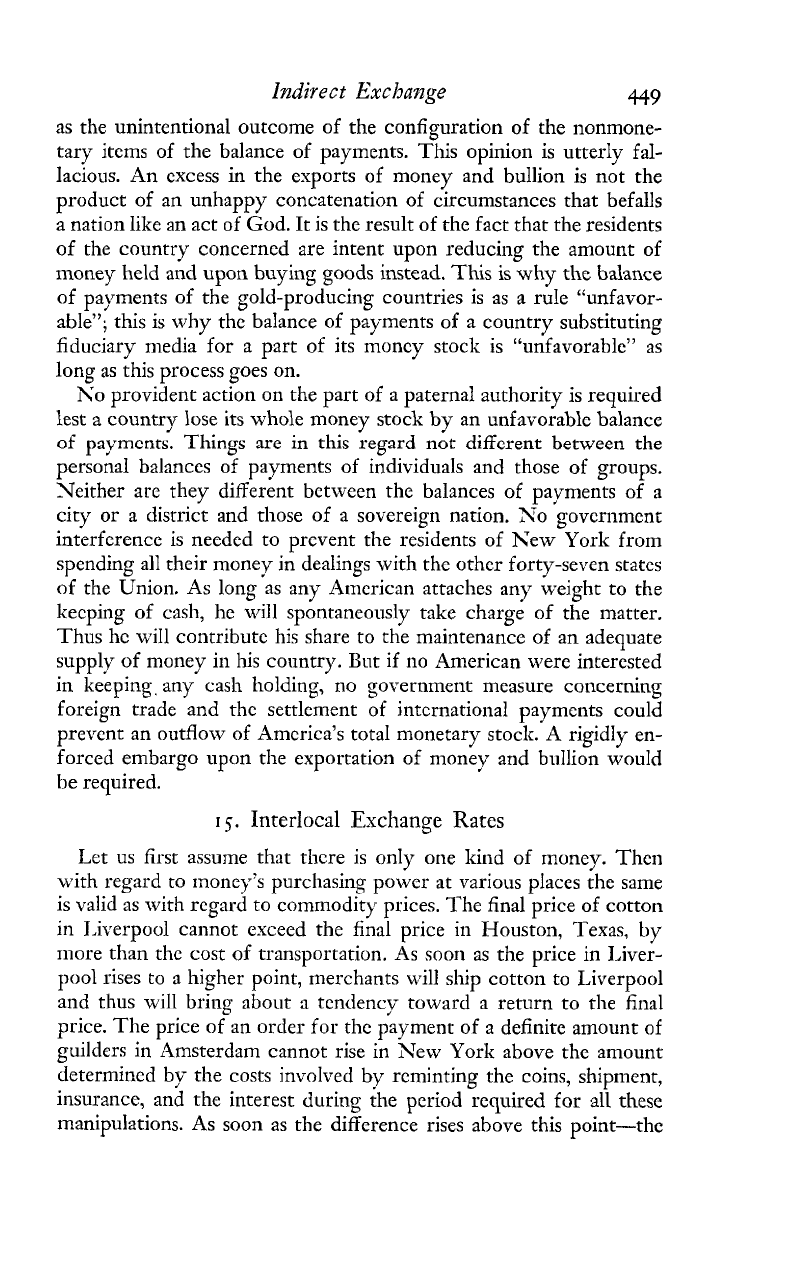
Indirect
Exchange
449
as the unintentional outcome of the configuration of the nonmone-
tary items of the balance of payments. This opinion is utterly fal-
lacious. An excess in the exports of money and bullion is not the
product of an unhappy concatenation of circumstances that befalls
a nation like an act of God. It is the result of the fact that the residents
of the country concerned are intent upon reducing the amount of
money held and upon buying goods instead. This
is
why the balance
of payments of the gold-producing countries is as
a
rule "unfavor-
able"; this is why the balance of payments of a country substituting
fiduciary media for a part of its money stock is "unfavorable" as
long as this process goes on.
No provident action on the part of a paternal authority is required
lest
a
country lose its whole money stock by an unfavorable balance
of payments. Things are in this regard not different between the
personal balances of payments of individuals and those of groups.
Neither are they different between the balances of payments of a
city or a district and those of a sovereign nation. No govcrnmcnt
interfcrence is needed to prevent the residents of New York from
spending all their money in dealings with the other forty-seven states
of the Union. As long as any American attaches any weight to the
keeping of cash, he will spontaneously take charge of the matter.
Thus he will contribute his share to the maintenance of an adequate
supply of money in his country. Bnt if no American were interested
in keeping, any cash holding, no Sovernment measure concerning
foreign trade and the settlement of jntcrnational payments could
prevent an outflow of America's total monetary stock. A rigidly en-
forced embargo upon the exportation of money and bullion would
be required.
15.
Interlocal
Exchange
Rates
Let
us first assume that there is only one kind of money. Then
with regard to money's purchasing power at various places the same
is valid as with regard to commodity prices. The final price of cotton
in IAiverpool cannot exceed thc
final
price in Houston, Texas, by
more than thc cost of transportation. As soon as the price in Liver-
pool rises to a higher point, merchants will ship cotton to Liverpool
and thus will bring about
a
tendency toward a return to the final
price. The price of an order for the payment of a definite amount of
guilders in Amsterdam cannot rise in New York above the amount
determined by the costs involved
by
reminting the coins, shipment,
insurance, and the interest during {he period required for all these
manipulations. As soon as the difference rises above this point-the
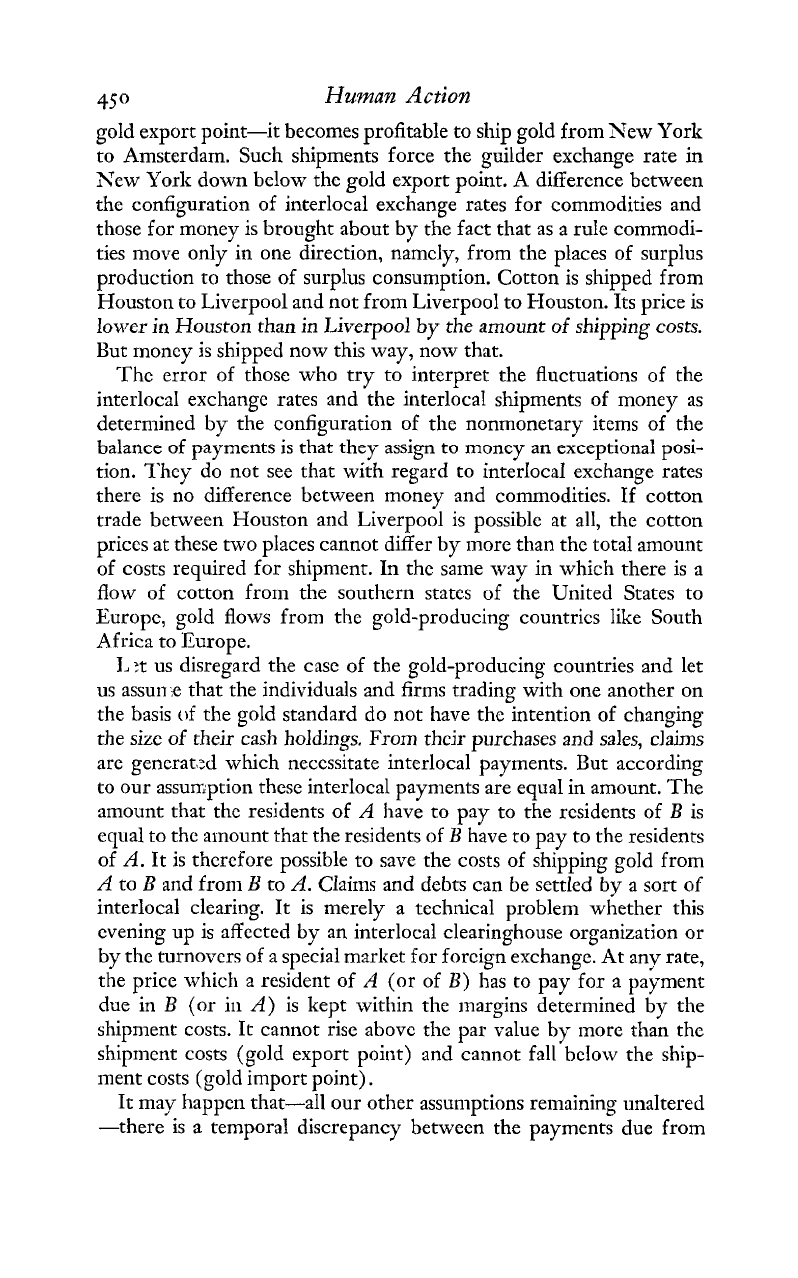
450
Human
Action
gold export point-it becomes profitable to ship gold from New York
to Amsterdam. Such shipments force the guilder exchange rate in
New York down below the gold export point.
A
difference between
the configuration of interlocal exchange rates for commodities and
those for money is brought about by the fact that as a rule commodi-
ties move only in one direction, namcly, from the places of surplus
production to those of surplus consumption. Cotton is shipped from
Houston to Liverpool and not from Liverpool to Houston. Its price is
lower
in
Houston than in Liverpool
by
the amount of shipping
costs.
But money
is
shipped now this way, now that.
The error of those who try to interpret the fluctuations of the
interlocal exchange rates and the interlocal shipments of money as
determined by the configuration of the nonmonetary items of the
balance of payments is that they assign to money an exceptional posi-
tion. They do not see that with regard to interIoca1 exchange rates
there is no difference between money and commodities.
If
cotton
trade between Houston arid Liverpool is possible at all, the cotton
prices at these two places cannot differ by more than the total amount
of costs required for shipment. In the same way in which there is a
flow of cotton from the southern states of the United States to
Europe, gold flows from the gold-producing countries like South
Africa to Europe.
L:t us disregard the case of the gold-producing countries and let
us assun e that the individuals and firms trading with one another on
the basis
of
the gold standard do not have the intention of changing
the size of their cash holdings, From their purchases and sales, claims
are generat:d which necessitate interlocal payments. But according
to our assumption these interlocal payments are equal in amount. The
amount that thc residents of
A
have to pay to the rcsidents of
B
is
equal to the amount that the residents of
B
have to pay to the residents
of
A.
It is therefore possible to save the costs of shipping gold from
A
to
B
and from
B
to
A.
Claims and debts can be settled by a sort of
interlocal clearing. It is merely a technical problem whether this
evening up is affected by
an
interlocal clearinghouse organization or
by the turnovers of a special market for foreign exchange. At any rate,
the price which a resident of
A
(or of B) has to pay for a payment
due in B (or
in
A)
is kept within the margins determined by the
shipment costs. It cannot rise above the par value by more than the
shipment costs (gold export point) and cannot fall below the ship-
ment costs (gold import point).
It may happen that-all our other assun~ptions remaining unaltered
-there is
a
temporal discrepancy between the payments due from
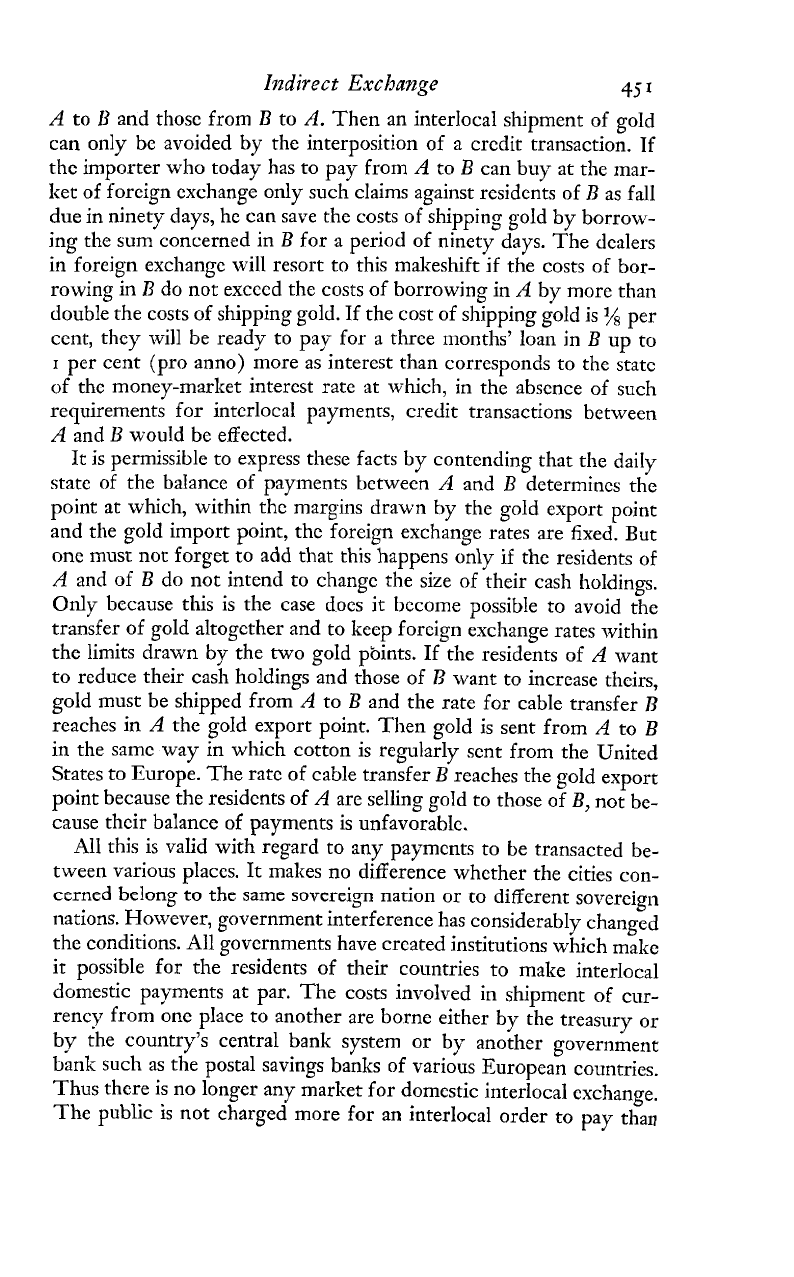
hdirect
Exchange
451
A
to
U
and those from
B
to
A.
Then an interlocal shipment of gold
can only be avoided by the interposition of a credit transaction, If
the importer who today has to pay from
A
to
B
can buy at the mar-
ltet of foreign exchange only such claims against residents of
B
as fall
dlle in ninety days, he can save the costs of shipping gold by borrow-
ing the
sum
concerned in
B
for a period of ninety days. The dealers
in foreign exchange will resort to this makeshift if the costs of bor-
rowing in
B
do not exceed the costs of borrowing in
A
by more than
double the costs of shipping gold. If the cost of shipping gold is
1/8
per
cent, they will be ready to pay for a three months' loan in
B
up to
I
per cent (pro anno) more as interest than corresponds to the state
of the money-market intercst rate at which, in the absence of such
requirements for interlocal payments, credit transactions between
A
and
B
would be effected.
It is permissible to express these facts by contending that the daily
state of the baIance of payments t)etween
A
and
B
determines the
point at which, within the margins drawn by the goId export point
and the gold import point, the foreign exchange rates are fixed. But
one must not forget to add that this happens only
if
the residents of
A
and of
B
do not intend to change the size of their cash holdings.
Only
because this is the case does it become possibIe to avoid the
transfer of gold altogether and to keep foreign exchange rates within
the limits drawn by the two gold points. If the residents of
A
want
to reduce their cash holdings and those of
R
want to increase theirs,
gold must be shipped from
A
to
B
and the rate for cable transfer
B
reaches in
A
the gold export poinr. Then gold is sent from
A
to
B
in the same way
in
which cotton is regularly sent from the United
States to Europe. The rate of cable transfer
B
reaches the gold export
point because the residents of
A
are selling gold to those of
B,
not be-
cause their balance of payments
is
unfavorable.
All this is valid with regard to any payments to be transacted be-
tween various places.
It
makes no difference whether the cities con-
cerned belong
to
the same sovereign nation or to different sovereigl~
nations. However, government interference has considerably changed
the conditions. All governments have created institutions which make
it possible for the residents of their countries to make interlocal
domestic payments at par. The costs involved in shipment of cur-
rency from one place to another are borne either by the treasury or
by ;he country's central bank system or by another government
~hnk such as the postal savings banks of various European countries.
Thus there is no longer any market for domestic interlocal exchange.
The public is not charged more for an interlocal order to pay than
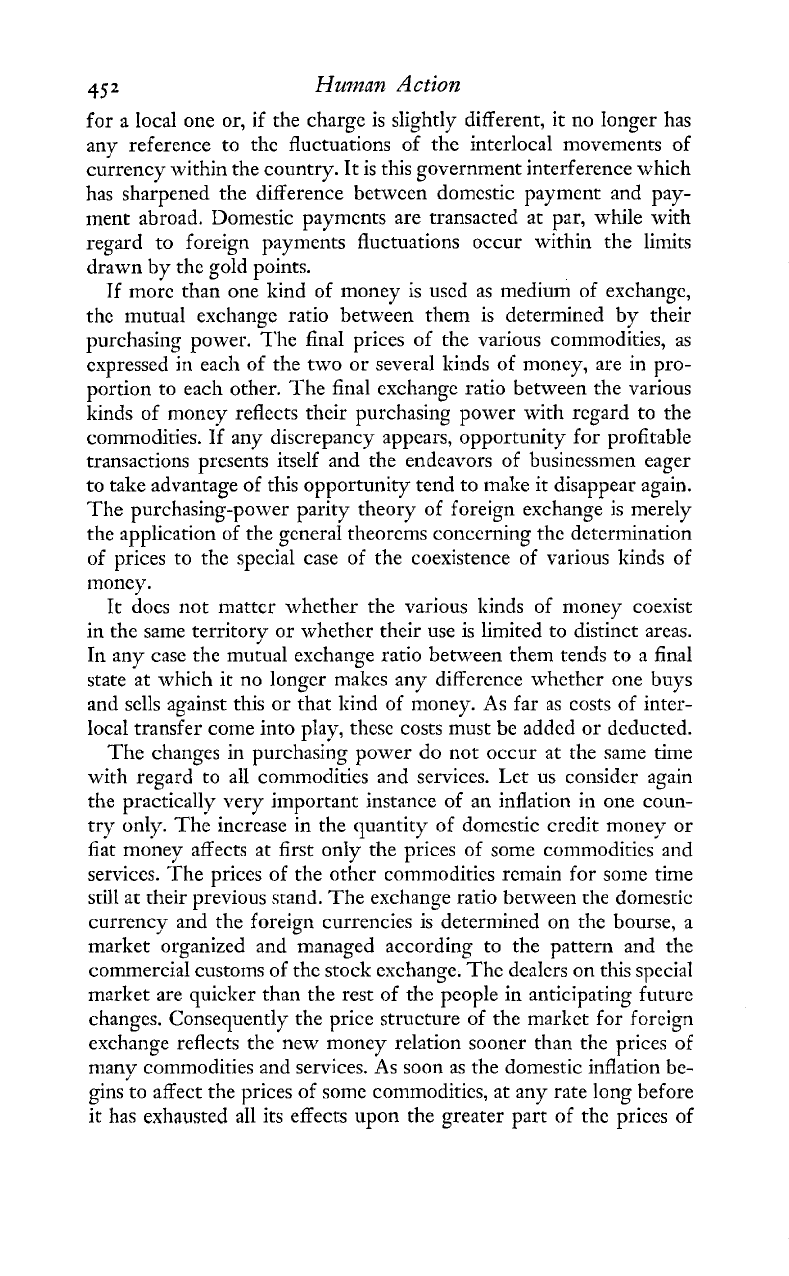
45
2
Human
Action
for a local one or, if the charge is slightly different, it no longer has
any reference to the fluctuations of the interlocal movements of
currency within the country. It is this government interference which
has sharpened the difference between domestic payment and pay-
ment abroad. Domestic payments are transacted at par, while with
regard to foreign payments fluctuations occur within the limits
drawn by the gold points.
If more than one kind of money is uscd as medium of exchange,
the mutual exchange ratio between thcm is determined by their
purchasing power. The final prices of the various commodities, as
expressed in each of the two or several kinds of money, are in pro-
portion to each other. The final exchange ratio between the various
kinds of money reflects their purchasing power with regard to the
commodities. ff any discrepancy appears, opportunity for profitable
transactions presents itself and the endeavors of businessmen eager
to take advantage of this opportunity tend to make it disappear again.
The purchasing-power parity theory of foreign exchange is merely
the application of the gcneral theorems conccrning the determination
of prices to the special case of the coexistence of various kinds of
money.
It does not matter whcthcr the various kinds of money coexist
in the same territory or whether their use is limited to distinct areas.
In any case the mutual exchange ratio between them tends to a final
state at which it no longcr makes any difference whcthcr one buys
and sells against this or that kind of money. As far as costs of intcr-
local transfer come into play, these costs must be added or deducted.
The changes in purchasi~g power do not occur at the same time
with regard to all commodities and services. Let us consider again
the practically very important instance of an inflation
in
one coun-
try only. ~hc increase in the quantity of domestic credit money or
fiat money affects at first only the prices of somc commodities and
services. The prices of the othcr commodities remain for some time
stiji ac their previous stand. Tne exchange rario between the domestic
currency and the foreign currencies is determined on the bourse, a
market organized and managed according to the pattern and the
commercial customs of the stock exchange. The dealers on this special
market are quicker than the rest of thc people in anticipating future
changes. Consequently the price structure of the market for foreign
exchange reflects the new7 money relation sooner than the prices of
many commodities and services. As soon
as
the domestic inflation be-
gins to affect the prices of some con~rnodities, at any rate long before
it has exhausted all its effects upon the greater part of the prices of
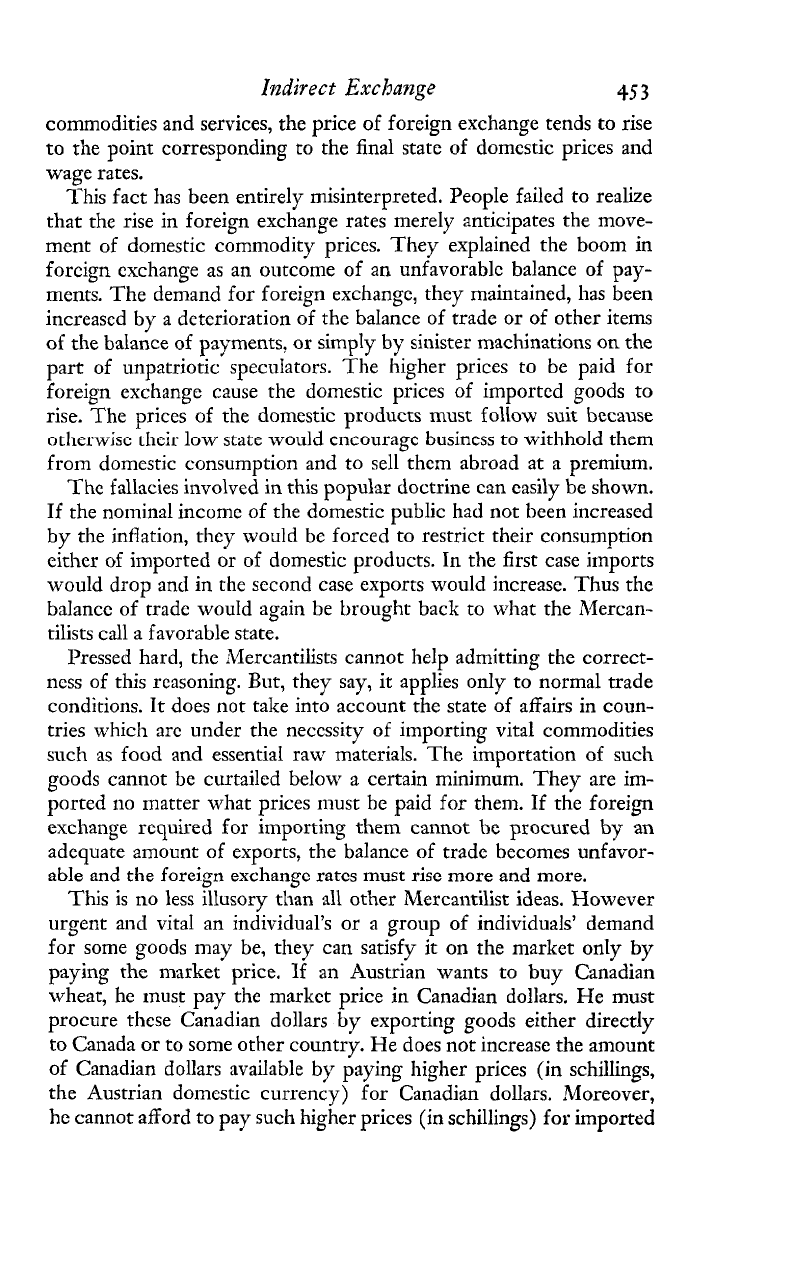
Indirect
Exchange
45
3
commodities and services, the price of foreign exchange tends to rise
to rhe point corresponding to the final state of domestic prices and
wage rates.
This fact has been entirely misinterpreted. People failed to realize
that the rise in foreign exchange rates merely anticipates the move-
ment of domestic commodity prices. They explained the boom in
forcign exchange as an outcome of an unfavorable balance of pay-
ments. The demand for foreign exchange, they maintained, has been
increased by a deterioration of the balance of trade or of other items
of the balance of payments, or simply by sinister machinations on the
part of unpatriotic speculators. The higher prices to be paid for
foreign exchange cause the domestic prices of imported goods to
rise. The prices of the domestic products must follow suit because
otherwisc their low state would encourage business to withhold them
from domcstic consun~ption and to sell them abroad at a premium.
The fallacies involved in this popular doctrine can casily be shown.
If the nominal income of the domestic public had not been increased
by the inffation, thcy would be forced to restrict their consumption
cither of imported or of domestic products. In the first case imports
would drop and in the second case exports would increase. Thus the
balance of trade would again be brought back to what the Mercan-
tilists call a favorable state.
Pressed hard, the LMercantilists cannot help admitting the correct-
ness of this reasoning. But, they say, it applies only to normal trade
conditions. It does not take into account the state of affairs in coun-
tries which arc under the necessity of importing vital commodities
such as food and essential raw materials. The importation of such
goods cannot be curtailed below a certain minimum. They are im-
ported no matter what prices must he paid for them. If the foreign
exchange required for importing them cannot
be
procured
by
an
adequate amount of exports, the balance of trade becomes unfavor-
able and the foreign exchange ratcs must rise more and more.
This is no less illusory than all other Mercantilist ideas. However
urgcnt and vital an individual's or a group of individuals' demand
for some goods may be, they can satisfy it on the market only by
paying the market price. If an Austrian wants to buy Canadian
wheat, he must pay the market price in Canadian dollars. He must
procure these Canadian dollars by exporting goods either directly
to Canada or to some other country. He does not increase the amount
of Canadian dollars available by paying higher prices
(in
schillings,
the Austrian domestic currency) for Canadian dollars. Moreover,
he cannot afford to pay such higher prices (in schillings) for imported
